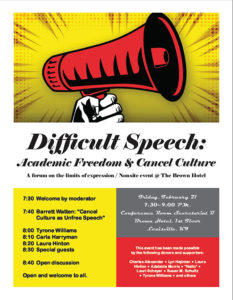Prospectus
Overview: This panel is an intervention into the toxin that has been injected into the Louisville Conference on Literature and Culture Since 1900 by the banning of one of its regular participants. We have created this panel as a “nonsite” of the regular program, as a group inquiry into cancel culture, “free” speech and its relationship to academic freedom, and the bias against “difficult speech” in today’s neoliberal university. We hope for good attendance and engaged discussion after presentations.
Perspective: From the Free Speech Movement where I began, to the neoliberal university where I have been called out, then canceled, what were the steps along the way? How did the truth-to-power of “calling out” become a condition of unfreedom? What are the conditions of speech that move from triggering to cancel culture? How do we address questions of speech—in poetics, in the classroom, the university, the public—that concern us?
Perspective: I am taking a global view of cancel culture and what I call preemptive culture, by which I mean the self-censorship that delimits what we call free speech. But I also don’t think that the cases of recent years, from Kenneth Goldsmith and Vanessa Place to Anders Carlson Wee and Joseph Massey, are the same. I will try to show how.
Perspective: One evening, the partner of the scapegoated person, exhausted from injustices that have invaded her life, falls into reverie. She types a poem haunted by Frank O’Hara, AIDS, the NEA 4, and questions of self-censorship that arose in her experiences of culture wars activism in 1990 San Francisco. She then observes the paranoia she has at the thought of reading or publicly circulating “A Personal Poem after . . . .”
Perspective: “Whose ‘Free Speech’?—or, the Dangers of the Neoliberal University to Academic Freedom”
In the context of today’s neoliberal or “corporate” university, my paper looks into the triangulation between administrators, students, and faculty. How is the “free speech” of students as educational “consumers” being used against faculty, tenured or tenure track, and contingent faculty or “adjuncts”? How does student “free speech” affect women and minorities as employees of the academic workplace? And how has their “free speech” made it difficult—if not impossible—for faculty to engage in “difficult” speech, both in evaluating students’ work honestly and teaching controversial topics?
Documents: AAUP Statement on “Triggering Warnings”
Links: Page 01, “Breaking My Own Story”
Page 02, “What Is Mobbing?”
Page 03, “The Aye of Poetry”
Page 04, “My Literary Controversies”
Page 05, “Questions of Unreason”
Page 06, “Defend Louisville!”
Page 08, “Nonsite Speech”
Page 09, “Archive News”
Page 10, “Public Documents”
Page 11,” “Endgame Notes”
Page 12, “This Tragedy Is Farce”Dispatches from the Poetry Wars: “PoBiz Stock Index Update, 6 February 2020”
———: “Dispatch #49: Letter to a Student at Wayne State University













